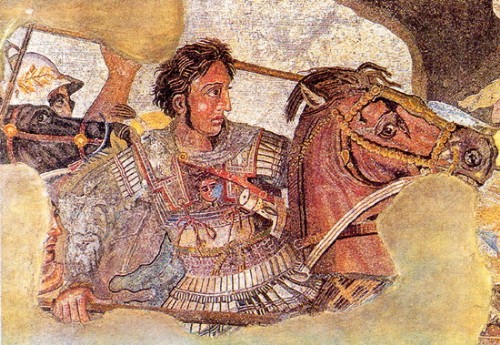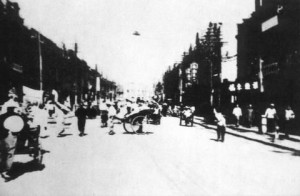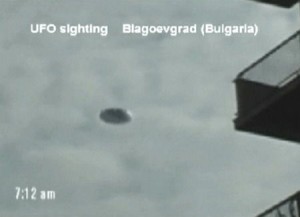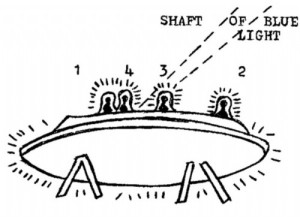THINK ABOUTIT UFO SIGHTING REPORT
Date: 329 BCE
Sighting Time:
Day/Night: Night
Location: Central Asia
Urban or Rural: Rural
Hynek Classification: NL (Nocturnal Light) Point or extended luminous source observed at night.
Duration:
No. of Object(s): two
Size of Object(s):
Distance to Object(s):
Shape of Object(s): shining silvery shields
Color of Object(s): silver
Number of Witnesses:
Source: Bruno Mancusi, UFO Updates mailing list, Apr. 18, 2003 Original Source
Summary: Alexander the Great records two great silver shields, spitting fire around the rims in the sky that dived repeatedly at his army as they were attempting a river crossing. The action so panicked his elephants, horses, and men they had to abandon the river crossing until the following day.
Full Report
Alexander the Great records two great silver shields, spitting fire around the rims in the sky that dived repeatedly at his army as they were attempting a river crossing. The action so panicked his elephants, horses, and men they had to abandon the river crossing until the following day.
UFO researcher Bruno Mancusi, in a posting on the UFO Updates mailing list from April 18, 2003, gives the following references to this event. These references were discovered by him and Macedonian historian Aleksander Donski. Mancusi writes:
I had an e-mails exchange in 2001 with a Macedonian historian, Aleksandar Donski, about this tale. We found the following references:
1. Frank Edwards, ‘Stranger than Science’, Pan, London 1963, p. 198 (1st US edition: 1959):
Alexander the Great was not the first to see them nor was he the first to find them troublesome. He tells of two strange craft that dived repeatedly at his army until the war elephants, the men, and the horses all panicked and refused to cross the river where the incident occurred. What did things look like? His historian describes them as great shining silvery shields, spitting fire around the rims… things that came from the skies and returned to the skies.”
Unfortunately, there is no reference.
2. Alberto Fenoglio, “Cronistoria su oggetti volanti del passato – Appunti per una clipeostoria”, ‘Clypeus’ #9, 1st Semester 1966, p. 7 (See English translation by Drake below) :
“L’assedio di Tiro
Durante l’assedio di Tiro nell’anno 332 a. C. sono stati notati degli strani oggetti volanti. Giovanni Gustavo Droysen nella sua opera “Storia di Alessandro il Grande” volutamente non lo cita, ritenendolo parto di fantasia dei soldati macedoni.
La fortezza non cedeva, le sue mura verso terra erano alte una quindicina di metri e costruite cos=EC solidamente che nessuna macchina d’assedio era in grado di danneggiarle. I tirii disponevano dei pi=F9 grandi tecnici e costruttori di macchine da guerra del tempo e intercettavano per aria le frecce incendiarie ed i proiettili scagliati dalle catapulte sulla citt=E0.
Un giorno, all’improvviso, comparvero sul campo macedone i misteriosi oggetti; questi scudi volanti, come erano stati battezzati, procedevano in formazione a triangolo con in testa uno molto grosso; gli altri erano pi=F9 piccoli di circa la met=E0. In tutto erano cinque. Narra l’ignoto cronista che girarono lentamente su Tiro, mentre migliaia di guerrieri delle due fazioni stavano a guardarli stupiti. Ad un tratto, dal pi=F9 grosso degli “scudi”, part=EC come un lampo che colp=EC un tratto delle mura e queste si sbriciolarono, altri lampi seguirono e mura e torri, come se fossero solo state costruite di fango, si dissolsero, lasciando via libera agli assedianti che si rovesciarono come una valanga dalle brecce. Gli “scudi volanti” volteggiarono sulla citt=E0, finch=E8 non venne completamente espugnata, poi velocissimamente sparirono in alto, confondendosi in breve con l’azzurro del cielo.”
(See English translation by Drake below.) No reference, too.
3. Gordon Creighton, “A new FSR catalog – The effects of UFOs on Animals, Birds and smaller creatures – Part 1”, Flying Saucer Review, vol. 16, No. 1, Jan-Feb 1970, pp. 26-28:
THE CATALOGUE-(i) B.C. TO 1946 A.D.
1. Middle East (_Reign of Alexander the Great_, 356-323 B.C.) A historian of the reign of Alexander the Great allegedly tells of two strange craft that dived repeatedly at his army, until the war elephants, the men, and all the horses panicked and refused to cross the river where the incident occurred… The historian describes the objects as “great shining silvery shields, spitting fire around the rims… things that came from the skies and returned to the skies.” Frank Edwards: ‘Stranger Than Science’ (See notes.) (Pan Books, London), p. 198.
The notes are on p. 28:
NOTES
Case 1: This story has been related by Frank Edwards as well as by other writers, but so far I have seen no indication as to _which_ classical author is responsible for it. It certainly _sounds_ good… _se non =E8 Vero =E8 ben trovato_. I hope that if there is a Greek or Latin text somebody can tell me where to find it. Meanwhile, let us keep the story as a fine introduction… “
As usual, Creighton wrote a very good commentary.
4. W. Raymond Drake, ‘Gods and Spacemen in Greece and Rome’, Sphere, London 1976, pp. 115-116:
“Frank Edwards, the noted American UFO reporter, quoting some source unfortunately not disclosed, states ‘Intelligent beings from outer space may already be looking us over.’ He exasperates us by claiming
‘Alexander the Great was not the first to see them nor was he the first to find them troublesome. He tells of two strange craft that dived repeatedly at his army until the war elephants, the men, and the horses all panicked and refused to cross the river where the incident occurred. What did things look like? His historian describes them as great shining silvery shields, spitting fire around the rims… things that came from the skies and returned to the skies.’119
This remarkable incident was apparently paralleled by an equally fantastic visitation during the Siege of Tyre by Alexander in 332 BC. Quoting Giovanni Gustavo Droysens Storia di Alessandro il Grande, the erudite Italian Alberto Fenoglio, writes in CLYPEUS Anno 111, No 2, a startling revelation which we now translate
‘The fortress would not yield, its walls were fifty feet high and constructed so solidly that no siege-engine was able to damage it. The Tyrians disposed of the greatest technicians and builders of war-machines of the time and they intercepted in the air the incendiary arrows and projectiles hurled by the catapults on the city.

One day suddenly there appeared over the Macedonian camp these “flying shields”, as they had been called, which flew in triangular formation led by an exceedingly large one, the others were smaller by almost a half. In all, there were five. The unknown chronicler narrates that they circled slowly over Tyre while thousands of warriors on both sides stood and watched them in astonishment. Suddenly from the largest “shield” came a lightning-flash that struck the walls, these crumbled, other flashes followed, and walls and towers dissolved, as if they had been built of mud, leaving the way open for the besiegers who poured like an avalanche through the breeches. The “flying shields” hovered over the city until it was completely stormed then they very swiftly disappeared aloft, soon melting into the blue sky.’120″ Strangely, Drake interpreted Edwards (ref. 119) and Fenoglio (120) versions as two different cases! And he didn’t understand that Fenoglio DOESN’T quote Droysen.
5. There are also some websites like http://www.ufon.org.uk/ufo_history.html (this link seems to doesn’t work anymore):
“329 BC:
Alexander the Great, via his historians: told of 2 strange objects in the sky that dived repeatedly at his army as they were attempting a river crossing. (Jaxartes River). The action so panicked his elephants, horses, and men they had to abandon the river crossing until the following day. They were described as great silver shields, spitting fire around the rims. Contributed by Thon”
There are two new pieces of information here: year 329 BC (not 332) and the name of the river. According to Donski, this name (Jaxartes) is correct, but “our” battle might happen near the river Indus. And always no reference is given…
So this story remains very dubious.
(Bruno Mancusi)




Related Reports
Kazakhstan Map of all Sightings